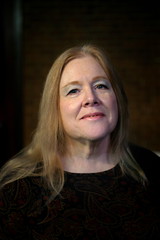Every Dog Has His Day: What About Us?
Raina on playsandplaywrights posted: "I've been a member of this group for a couple of years, and I can't remember this being discussed, although I know it is old news. All studies show that women only write about 20% of the plays that are produced, and only direct about 20% of the plays that are produced, despite comprising 52% of playwriting MFA students, and 60% of the playgoing public. Since yesterday was
Blog Against Sexism day, I thought I'd send my blog post to the group, and ask for commentary."
I replied: I discuss it all the time. I get quite shrill on the subject.
Really want to get depressed? It's now down to 16% women written
plays, after rising to 22% in the late 1990s. Which is still a
smaller % than the plays written by women that were produced in the
1890s! I didn't blog against sexism today-- unless you count the quick
description I put up around 11:30 pm on my Stageblog re: the
International Center for Women Playwrights International Women's Day
Celebration I co-produced at the Boston Playwrights
Theatre. Back in the Dark Ages, I was the only female in my
university play writing class. My (all male) English professors
taught their students that there had never been a good play written
by a woman, and my (all male) psychology professors assured me that
there never would be one. I swore then and there to do everything in
my power to make it very difficult for a professor to say such things
to my great-great-granddaughters. Or yours. People, male or female,
who share this goal might consider joining, on the
ICWP web site.
I've got two more Celebrations I'm producing this coming week: at
Central Square Branch Library in Cambridge Saturday 10am-2pm, and at
the Brighton Branch of the Boston Public Library Thursday 7-9 pm.
You can read all about them on the ICWP web site. If you're near
Boston, come!
Boston missed the "boom" in women playwrights in the 1990s. Most
companies here went season after season without a single female
author featured. But this seems to be a breakthrough year. I just
checked this week's listings in the
Boston Phoenix: 24 items under
"Theatre" 3 plays by women, 2 musicals with a woman writer. Two
others just closed. 5 or 7 out of 24 doesn't sound great; it's still
around 20% -- but it's a heck of a lot better than 5 or 10 years ago!
Labels: Blog Against Sexism Day, Boston Playwrights, Boston Theatre, International Centre for Women Playwrights. Boston Playwrights





